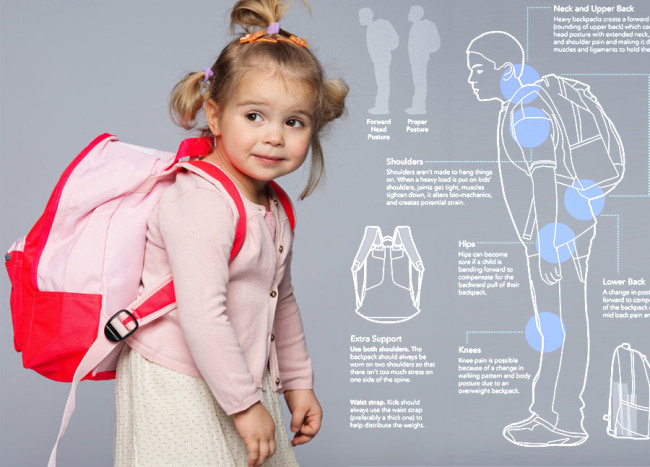
Now that we’re two months into the school year, there are couple of things to keep a look out for, such as a  lunches, heavy backpacks, and sleepiness. Here are a few tips to help your child stay as healthy as possible to help them both enjoy and perform well at school.
lunches, heavy backpacks, and sleepiness. Here are a few tips to help your child stay as healthy as possible to help them both enjoy and perform well at school.
A Healthy Back: As your child heads out the door for school, the first thing that he/she puts on is their backpack. It is an essential part of everyday life that no student can go without. As children get deeper and deeper into their education, these book bags start becoming heavier and heavier. It’s no surprise that it can have a significant impact on health and wellbeing. A child wearing a backpack incorrectly or that is too heavy can experience discomfort, fatigue, muscle soreness, and musculoskeletal pain especially in the lower back. The US Consumer Product Safety Commission reported that almost 28,000 sprains, strains, dislocations and fractures caused by wearing a heavy backpack, were treated in emergency rooms and clinics in 2010.
There are a number of signs that indicate when a backpack is too heavy; changes in posture, difficulty putting the bag on or taking it off, pain, numbness, and red marks.
A Healthy Lunch: Prepared lunches play an important role in both the health of a child and their academic performance. The Centers for Disease Control and Prevention (CDC) has suggested that hunger can lead to poor school performance; healthy students tend to perform better than unhealthy ones.
Packed lunches should aim to contain a mixture of different types of food:
Leftovers from family dinners can also make providing a healthy and fulfilling lunch a simpler task. Although some children are happy to eat the same thing every day, varying what goes into a lunch box can encourage them to try out new things that they otherwise might not consider.
Children are more likely to eat food that they have chosen themselves. So, including your child in the process of choosing and preparing food lunch can teach them about making healthy choices for the long term.
A Good Nights Sleep: Sleep is important for everyone, most importantly, for children. It recharges their batteries so that they have the energy to engage and be productive with their schoolwork
A study led by researchers from Concordia University in Montréal, Canada, examined the impact of getting a good night’s sleep on children’s cortisol levels – a hormone that helps regulate the body’s cardiovascular, metabolic and immune systems. Cortisol is produced as a result of stress and is useful for preparing the body’s “fight or flight” response. However, too much cortisol can increase an individual’s risk of certain health problems, such as heart disease and depression.
Less Screen Time: If your child is stressed, it might be tempting to allow them to relax with video games or watch television, but too much screen time can have a negative impact on their health. Using electronic devices before bedtime could reduce the quality of sleep. A study published by BMJ Open found that if a child took more than an hour to get to sleep, there was a 50% greater likelihood that they were spending more than 4 hours a day outside of school using electronic devices.
The tips above are ones that not many people think about and can go easily missed. My hope is that now they will remain in the back of your mind for you to consider as part of a daily routine.